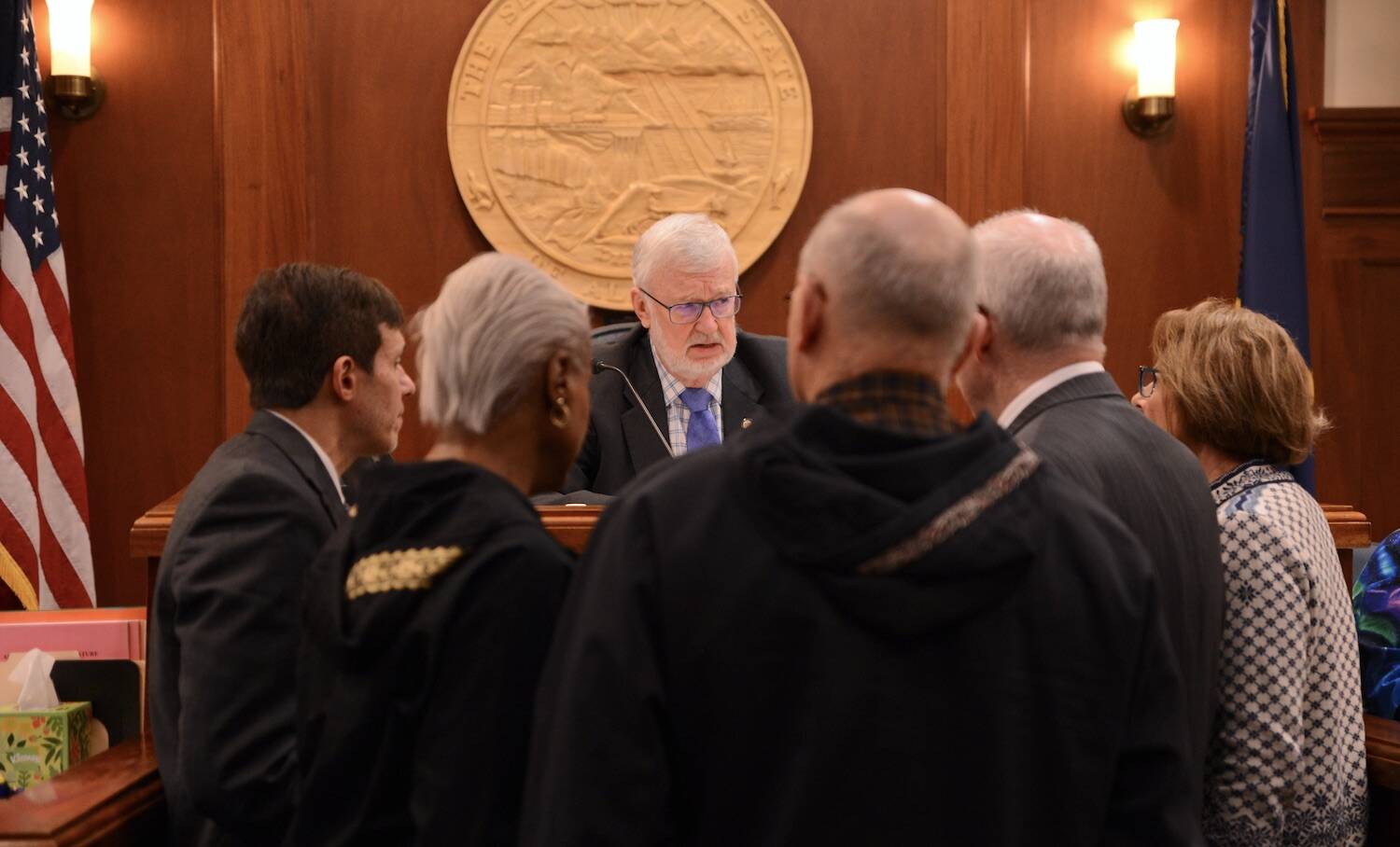Alaska senators will address education, elections, energy and the state’s public employee retirement system when they reconvene in January.
Late Wednesday, leading senators confirmed that the Senate will continue to be led by a large coalition of Republicans and Democrats.
Members of the new coalition were vague about its precise makeup, saying that negotiations are still ongoing. After one member of the coalition lost reelection and another decided against running for another term, that coalition will be slightly smaller than the supermajority that has led the Senate for the past two years.
Sen. Gary Stevens, R-Kodiak, has been president of the Senate for the past two years and will serve another two years. He said Thursday that the Senate majority will likely finalize its priorities at a retreat in late December or early January, “but it’s probably going to be similar to last time: the issue of forward-funding education, the issue of retirement, and how do we address those without putting us into tremendous debt?”
“I believe we need to do education early, if we can,” he said, “and also I’d like to see us deal with elections issues early on so we don’t wait until the last minute.”
This spring, a major elections reform bill died on the last day of the legislative session. The same thing happened with another elections reform bill two years ago.
“One of the things I’ve heard about is election reform,” said Sen. Bill Wielechowski, D-Anchorage and a member of the coalition.
“There’s just a recognition that we have a number of things that need to be fixed,” he said, mentioning signature verification on absentee ballots, witness signatures on those ballots, and adding the ability for voters to “cure,” or fix, errors that would otherwise disqualify their votes.
“I think making it easier for people to vote — it’s not a Democratic or Republican issue,” he said.
Sen. Cathy Giessel, R-Anchorage, said energy issues “will be a huge topic,” with hearings on the impending Cook Inlet energy crunch.
“Not just Cook Inlet natural gas, but what alternative fuels are available? How do we get them online sooner? Will the new national administration help us in getting other energy sources online faster? I don’t know, and all interesting questions,” she said.
She also said she’s interested in discussing how to protect the Alaska Permanent Fund from overspending.
“Whether that rises to our priority list or not, I don’t know, but I think it’s a possibility,” she said.
The Senate majority coalition will include at least 13 of the Senate’s 20 members.
According to a written statement, Giessel will continue as majority leader and Wielechowski will continue as chair of the rules committee. Sen. Lyman Hoffman, D-Bethel, will be chair of the operating budget in the finance committee, Sen. Bert Stedman, R-Sitka, will be chair of the capital budget in the finance committee, and Sen. Donny Olson, D-Golovin, will be chair of any non-budget bills in the finance committee.
Sen. Kelly Merrick, R-Eagle River, was named as majority whip, and Sen. Elvi Gray-Jackson, D-Anchorage, was named chair of the Legislative Budget and Audit Committee.
In addition to the listed leaders, Sens. Jesse Bjorkman, R-Nikiski; Matt Claman, D-Anchorage, Forrest Dunbar, D-Anchorage; Löki Tobin, D-Anchorage; and Jesse Kiehl, D-Juneau, confirmed that they are members of the new caucus.
The winner of the race between Sen. Scott Kawasaki, D-Fairbanks, and Republican challenger Leslie Hajdukovich could join it as well. Kawasaki said he would join the coalition, and Hajdukovich said before Election Day that she is open to the idea.
“I think it’s likely that whoever wins would join the majority caucus,” Stevens said.
Kawasaki holds a small but not insurmountable lead in ballots counted through Thursday.
Sen. James Kaufman, R-Anchorage, declined comment on his status, and did Sen.-elect Mike Cronk, R-Tok, did not return a call seeking comment.
Kaufman has been a member of the coalition for the past two years, and Cronk replaces Sen. Click Bishop, R-Fairbanks, who had been a coalition member.
Senator-elect Robert Yundt of Wasilla declined immediate comment, but one of the planks of his campaign platform was not working with Democrats in the Senate, and he isn’t expected to join.
That gives the Republican minority at least four seats.
If one of them chooses to join the minority instead of the coalition majority, the minority will be guaranteed at least one seat on every Senate committee, allowing its members to have a say on legislation before it reaches the Senate floor. If the minority stays at four members, it isn’t guaranteed any committee assignments.
“There’s a good chance that they will have five members,” Stevens said. “We’ll see how that works out.”
The sitting members of the minority, Sens. Shelley Hughes, R-Palmer; Robert Myers, R-North Pole; and Mike Shower, R-Wasilla, did not return calls seeking information Thursday.
• James Brooks is a longtime Alaska reporter, having previously worked at the Anchorage Daily News, Juneau Empire, Kodiak Mirror and Fairbanks Daily News-Miner. This article originally appeared online at alaskabeacon.com. Alaska Beacon, an affiliate of States Newsroom, is an independent, nonpartisan news organization focused on connecting Alaskans to their state government.

